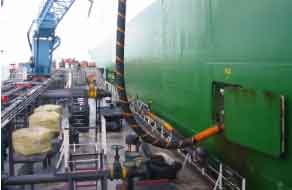The new year has arrived, and with it new rules in place from the International Maritime Organization (IMO) on reducing sulfur emissions from cargo ships.
The new rules passed in 2018 require ships either switch to new low sulfur diesel fuel - much more expensive than the current bunker fuel - or install scrubbers that costs millions for each ship. (See Low Sulfur Fuel Surcharges will be Key Bargaining Point for Container Shipping Lines.)
Supply Chain Digest Says... |
|
|
Many called for the new rules to be delayed, with concern the costs could literally put some of the generally financially weak ocean carriers out of business, if they were not able to pass all the new costs on to shippers. Others predicted a new wave of mergers in the sector. There are even concerns the new demand for diesel could raise prices for truckers others outside sector by 20% or more.
But the IMO stood firm and the new rules are now effective, though how exactly they will be enforced is not clear.
The two choices – high cost fuel or installation of scrubbers - will have different cost implications for carriers and hence shippers. But just how different depends on how the low cost sulfur diesel pricing plays out.
Additional fuel costs for the low sulfur diesel could be as much as $50 billion over the next four years, industry experts say. There will billions more spent for scrubbers, which cost $2-4 million each, and require maintenance and will need to be replaced every five years or so.
Clarksons Platou Securities said in a recent research note that the price difference between heavy oil and low-sulfur fuel blends was $280-300 per ton currently, depending on where in the world it is purchased. The Wall Street Journal reports that industry executives expect the low-sulfur fuels to cost about $240 more per ton than conventional fuel by the end of next year, down a bit from current levels.
Another check find the current cost of low sulfur fuel in Singapore is about $690 per ton. A year ago, the cost of bunker fuel in Singapore was around $340 per ton.
That big delta makes it financially attractive to install scrubbers – if the price of diesel doesn't come way down.
Robert Macleod, CEO of Norway-based tanker giant Frontline Management, told the Journal he expects the company's investment in scrubbers to provide a payback in just 9-18 months.
(See More Below)
|
CATEGORY SPONSOR: SOFTEON |
|
|
|
|
|
 Conversely, Maersk Line, the industry's largest container carrier, says it is keeping its options open, but notes using the cleaner fuels is its preferred choice because it expects the cost delta to decline as refiners increase production. That even though Maersk estimates the cost of the new fuel could be as much as $2 billion annually. Conversely, Maersk Line, the industry's largest container carrier, says it is keeping its options open, but notes using the cleaner fuels is its preferred choice because it expects the cost delta to decline as refiners increase production. That even though Maersk estimates the cost of the new fuel could be as much as $2 billion annually.
A container ship carrying 8,000 20-foot equivalent units (TEUs) across the Pacific at a speed of 19 knots burns about 100 tons of fuel oil per day. Using the fuel costs in Singapore cited above, an 8,000-TEU trans-Pacific vessel would see a year-on-year fuel cost increase of $35,000 per day.
The big question for carriers opting to use new either new fuel or scrubbers is how to get shippers to pay for increased costs.
Industry analysts such as Alphaliner have already warned shippers about confusing new fuel surcharge formulas coming from container carriers. And how lines installing scrubbers will try to create a surcharge formula is not clear.
Add on top of that the container shipping sector's poor record of enforcing surcharges, and how all this plays out is unclear indeed.
Anything to add on this contentious issue? Let us know your thoughts at the Feedback section below.
Your Comments/Feedback
|